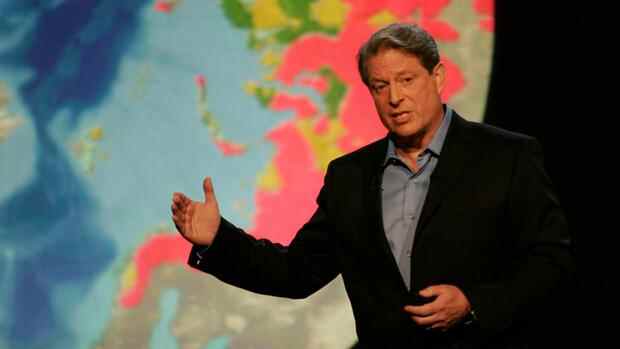“We are in the early stages of a global sustainability revolution.”
(Photo: AP)
Soelden The importance of green technologies continues to grow. The global market volume of green tech and resource efficiency exceeded the mark of four trillion euros for the first time last year, according to a report by the Federal Environment Ministry. According to forecasts, the global market volume of the industry will be around ten trillion euros worldwide in 2030.
In Germany, too, politicians are hoping for green tech: FDP leader Christian Lindner wants to counter the climate crisis with “German engineered climate protection”. At the same time, leaders from 197 nations and several thousand non-governmental organizations are negotiating the further implementation of the Paris climate protection agreement of 2015. The financing of the climate protection projects was only on the agenda on Wednesday.
In this context, the conversation between former US Vice President Al Gore and Miriam Meckel, founder of the digital training initiative ada, took place at the Giga summit of the Handelsblatt. Gore speaks about technologies to combat global warming, the importance of the European Union and Germany as the motherland of the automotive industry.
The world is in the early stages of “a global sustainability revolution, driven in part by machine learning, artificial intelligence, the Internet of Things and amazing advances in biotechnology”. You have “the extent and the effects of the industrial revolution, coupled with the speed of the digital revolution”.
Top jobs of the day
Find the best jobs now and
be notified by email.
Admittedly, technical progress played an important role “in fueling the climate crisis,” warns Gore. “We are experiencing the consequences of our delayed action, and yet we continue to emit 162 million tons of pollutants into the air every day as if the atmosphere were an open sewer.”
In the future, however, technology and innovation will help to “break through the destructive dependence of mankind on fossil fuels”. Gore is optimistic that politics has reached a turning point and will muster the will to “reduce greenhouse gas emissions to zero”.
Great hopes for Germany and Europe
As a leading industrial nation, Germany has a key role to play in this. The German automotive industry is recognized worldwide, he says, and he hopes that the country will “accelerate the transition to electromobility”. Automakers around the world made commitments to move away from the internal combustion engine, so fossil propulsion technologies will disappear from the market, he predicts.
Technological progress alone is not enough: “In order to solve the climate crisis, we must also deal with the crisis of democracy,” warns Gore. In the past, the European Union had expressed “the conscience of mankind”, and now it was the turn of the United States.
Before the Paris climate protection agreement, rapprochement between the USA and China was the key to solving the climate issue, now it is the partnerships between the USA and Germany and Europe. “The EU provided the decisive impetus for the future that the world needed,” says Gore.
The money is missing
Using green technologies is expensive. Banks and investors promise to only supply companies with money that operate according to ecological criteria. But economists warn of the donors’ reservations. “Investors are holding back because they don’t believe that politicians can stick to the ambitious climate targets,” says Ottmar Edenhofer, director of the Potsdam Institute for Climate Impact Research. Politicians must “enter into credible self-commitments,” he demands. Then investors would also finance new technologies. Gore calls on politicians to “give donors the certainty that investments do not pose any risks”. He hopes that this will free up private capital, including in developing countries.
But it is not just new technologies that should solve the climate problem, Gore believes, and he advises thinking about natural techniques: “The oldest known technology for reducing carbon in the atmosphere is the tree,” he says. Natural climate solutions, such as sustainable forestry and regenerative agriculture, could not only help to reduce emissions, protect nature and preserve biodiversity. They also created new jobs.
More: The technologies of the future lack capital
